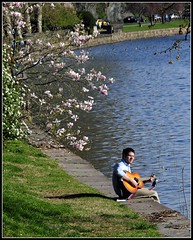
- Image by Tony the Misfit via Flickr
© I.Woloshen
Often I come across songwriters who are confused as to the labels we have for different parts of a song. Verses and choruses are obvious, I think! However, what is a bridge? A pre-chorus? Intro? Extro? Here are my definitions (I’m smart enough to know that definitions can change from writer to writer!):
A bridge is a musical and/or lyrical break in the song, often inserted after a couple of verses and choruses. It can, when written effectively, give a little change of pace to the song once the repetition begins to become obvious to the listener. Sometimes I might write a simple musical break with no lyrics, usually in the same key, but with a different chord progression. Lyrics are often part of a bridge, however. I’ve also met pro songwriters who HATE bridges and never write ’em! To each his own!
A pre-chorus is a lead up to the chorus, a kind of “build” if you will. They are not as common as bridges, but can be very effective in bridging the verse just before the chorus.
Intros are at the very beginning of a song, the introduction to it. If you are pitching your songs, better keep your intros SHORT!! Publishers, A&R reps and label execs usually don’t have the patience for long self-indulgent intros, and may give up before you even get to the first verse! Sometimes an intro can be effective by foreshadowing the chorus chords just a little, or a quick build of instruments into the song. When I’m playing live, I may stretch the intro to a song and let it build a groove before I start singing.
Extros are often mis-labeled “outros” (I hate that!)…and are the lead-outs or endings to a song. Again, they can get too long and self-indulgent. The faders on recording equipment back in the sixties and seventies lead to just about every recorded song fading out…! There’s nothing that beats a nice, tight and unexpected ending, though!
Middle Eight – this is a term you might hear that sometimes refers to a type of bridge, and other times is simply an instrumental break, usually (but not always) eight bars long. In a rock song, for instance, it might contain a guitar lead…Eddie Van Halen howling alone on his guitar for eight bars 🙂
Breakdown – sometimes about two-thirds of the way through a song, you’ll suddenly hear just the drums playing alone, or the vocals alone, or hand-clapping, etc., with nothing else in the mix. Then, there will be a build-up of instruments again. This is what is referred to as a “breakdown”. It’s more of an arragement term, rather than a songwriting one. But if you’re in a studio trying to get a good recording of your song, you might use this trick to make your arrangement more interesting.
And here’s my extro…. 🙂
![Reblog this post [with Zemanta]](http://img.zemanta.com/reblog_e.png?x-id=f434b07e-d154-4c7f-95f7-96c881d6f8ff)

